人教版八年级英语上册 Unit 1 Where did you go on vacation? Section A(1a-2c)课件 (共47张,无音频PPT)
文档属性
| 名称 | 人教版八年级英语上册 Unit 1 Where did you go on vacation? Section A(1a-2c)课件 (共47张,无音频PPT) | 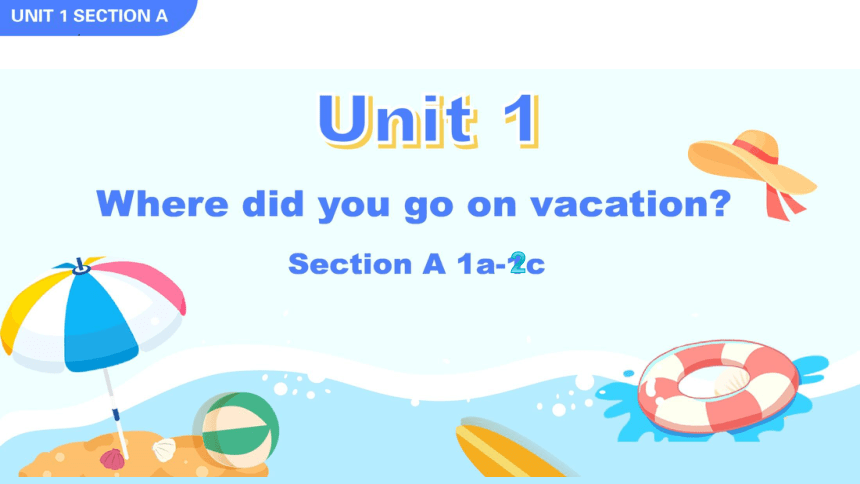 | |
| 格式 | pptx | ||
| 文件大小 | 9.3MB | ||
| 资源类型 | 教案 | ||
| 版本资源 | 人教新目标(Go for it)版 | ||
| 科目 | 英语 | ||
| 更新时间 | 2022-07-08 08:47:36 | ||
图片预览

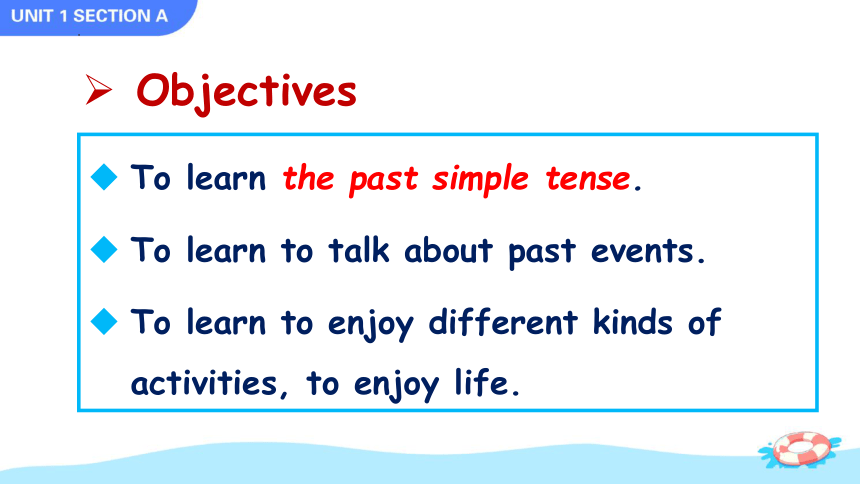
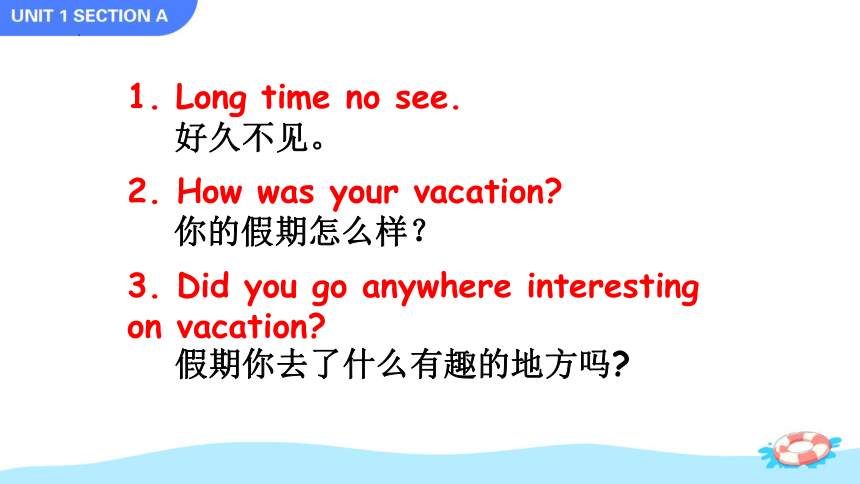

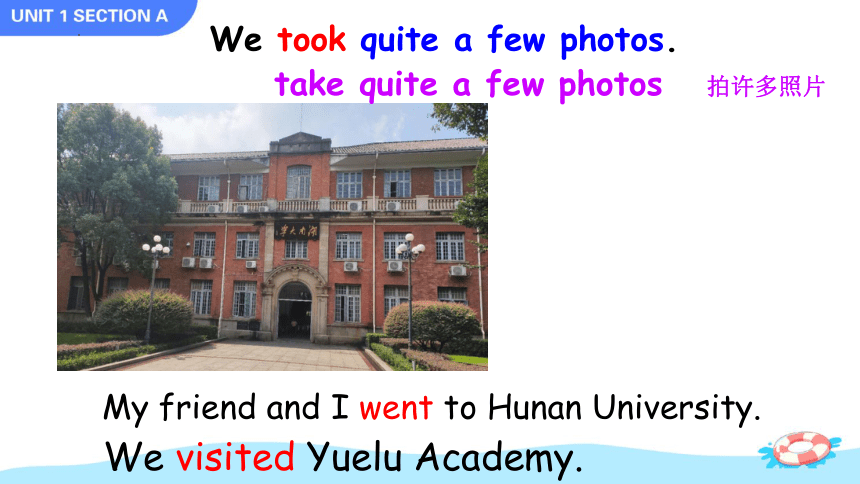
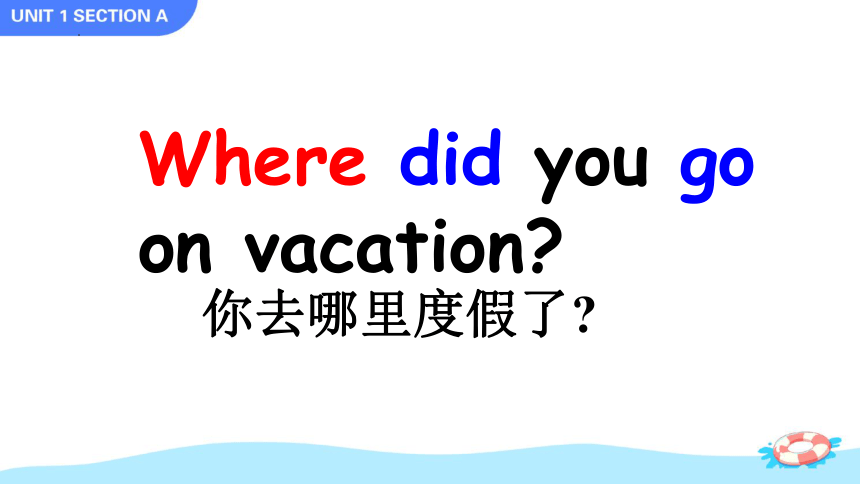
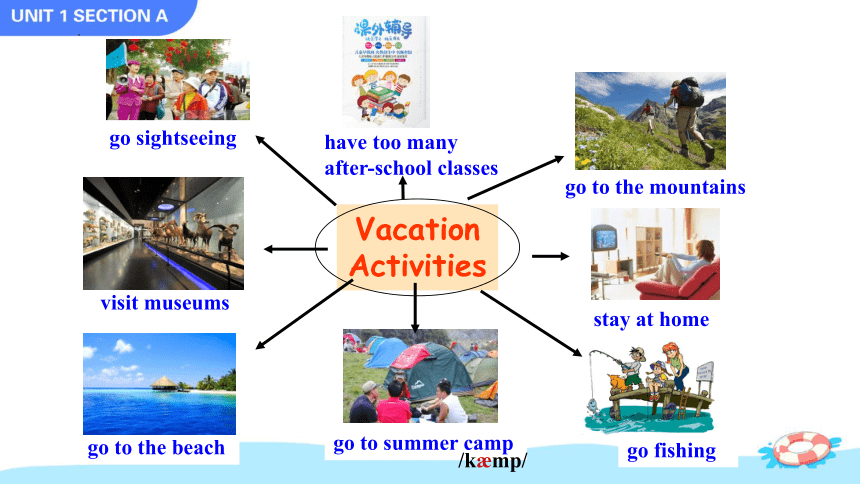
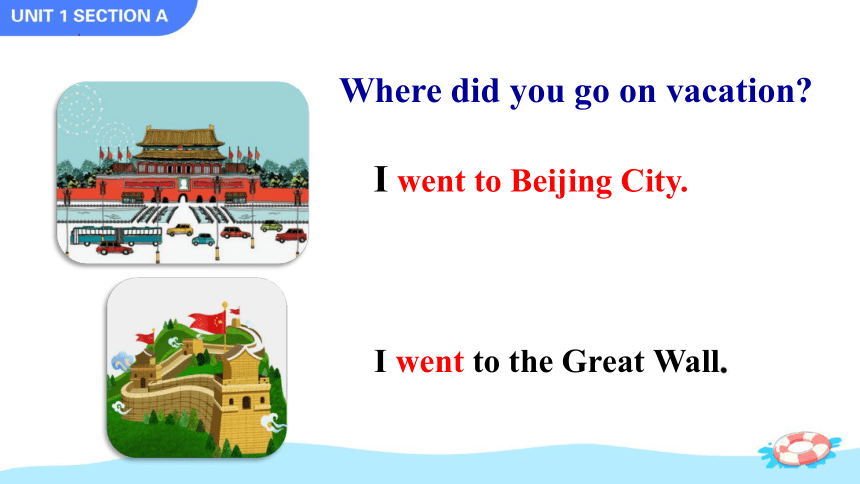
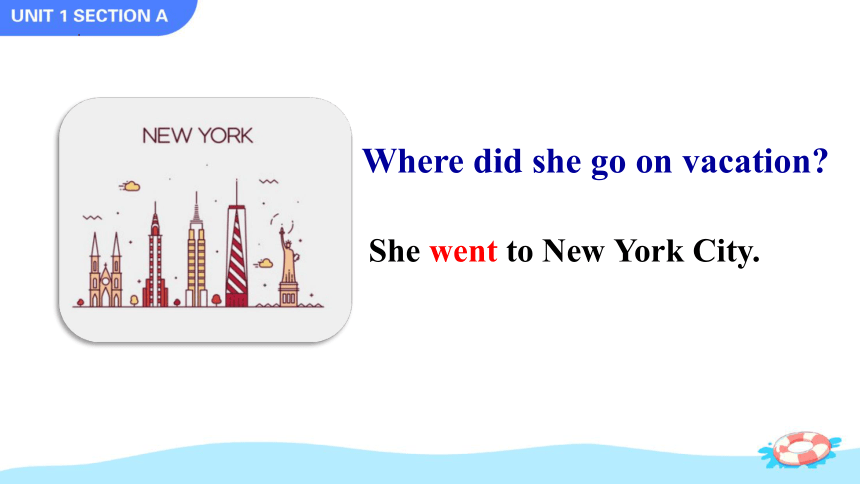
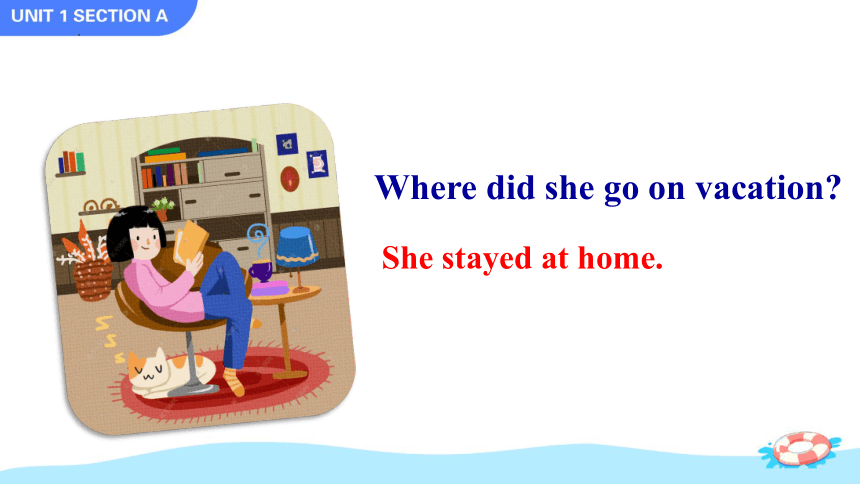
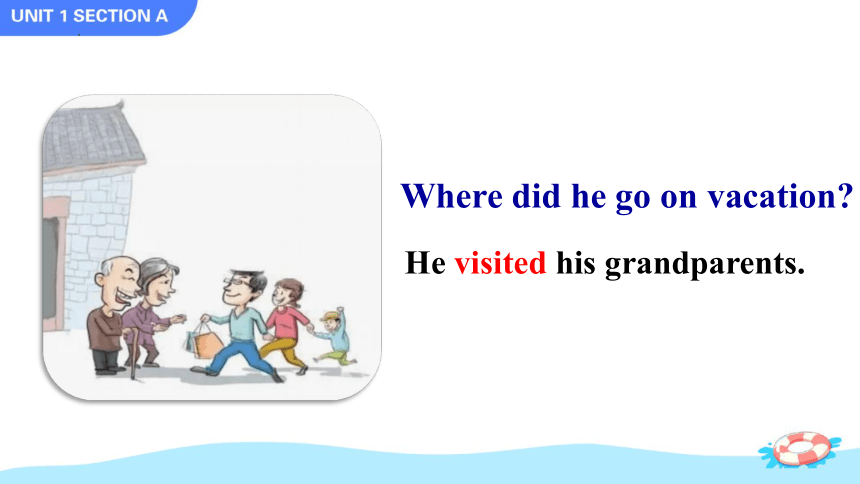
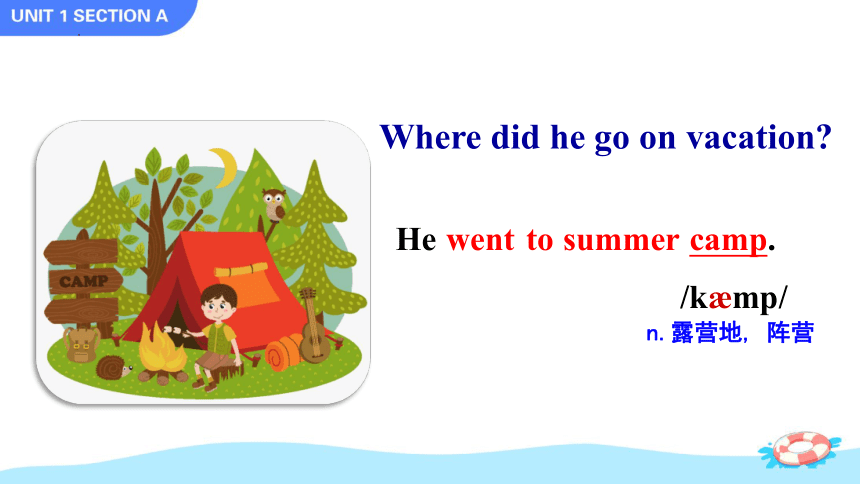
文档简介
(共47张PPT)
2
To learn the past simple tense.
To learn to talk about past events.
To learn to enjoy different kinds of activities, to enjoy life.
Objectives
Long time no see.
2. How was your vacation
3. Did you go anywhere interesting on vacation
好久不见。
假期你去了什么有趣的地方吗
你的假期怎么样?
Where did I go on vacation
most of the time
大部分时间
stay at home
待在家
My friend and I went to Hunan University.
We visited Yuelu Academy.
We took quite a few photos.
take quite a few photos 拍许多照片
Where did you go
on vacation
你去哪里度假了
go fishing
go to summer camp
visit museums
go to the beach
go sightseeing
go to the mountains
Vacation
Activities
stay at home
have too many
after-school classes
/k mp/
Where did you go on vacation
I went to Beijing City.
I went to the Great Wall.
She went to New York City.
Where did she go on vacation
Where did she go on vacation
She stayed at home.
He visited his grandparents.
Where did he go on vacation
He went to summer camp.
/k mp/
Where did he go on vacation
n.露营地, 阵营
Where did they go on vacation
They went to the mountains.
They went to the beach.
Where did they go on vacation
Where did they go on vacation
They went to the museum.
= They visited the museum.
1. stayed at home _____
2. went to New York City ___
3. visited my uncle ___
4. went to summer camp ____
5. went to the mountains ___
6. went to the beach ____
7. visited museums ___
Match the activities with the pictures [a-g].
1a
a
b
c
e
f
g
d
b
d
c
g
a
e
f
1. Tina
2. Xiang Hua
3. Sally
4. Bob
5. Tom
4
5
3
2
Listen and number the people in the picture [1-5].
1b
1
mountains/C
New York/b
at home/f
visited his uncle, went fishing/g
summer camp/d
n. 对话,会话
1c
Make conversations about the people in the picture.
A: Where did Tina go on vacation
B: She went to the mountains.
其中did是助动词,没有人称和数的变化,
谓语动词是实义动词,且用原形。
Where did you… 是含有实义动词的一般过去时的特殊疑问句,其句式结构:
1.Where did you go on vacation
你去哪里度假了
度假
Language Points
特殊疑问词+did+主语+动词原形+其他
1.他们昨天去哪儿了?
2.上个星期天你做什么了?
Where did you go on vacation
你去哪里度假了
Where did they go yesterday
What did you do last Sunday
特殊疑问词+did+主语+动词原形+其他
Practice
单项选择。
( )1. —Where you go last weekend
—I to the beach with my friends.
A.are;went B.do;go
C.did;went D.were;went
( )2.—I went to see you last Saturday. But you
weren't at home. Where were you
—Oh, I was _____ vacation.
A.by B.at C.for D.on
C
D
2.I stayed at home.
我待在家里。
1)stay可以作及物动词(vt.),
也可以作不及物动词(vi.) 。
当它作vi时就不能直接接宾语,
其后接相应的介词短语,表地点 或表状态。
e.g. stay at home 呆在家中
stay in the office 继续任职 (掌权)
stay awake 不睡 (醒着)
stay in the army 留在部队中
We’re staying in the same hotel.
我们正住在同一家旅馆。
2) home与house, family的区别
home指“家”这个概念,包括“住处”和“家人”。
house则指“房子”、“住宅”,侧重于建筑结构。
family则指“家庭成员”。
I watched TV at home last night.
我昨晚在家里看电视。
This house is very beautiful.
这房子真漂亮。
e.g.
My family is a small but happy one.
我家人不多但很幸福。
My family are watching TV.
我的家人在看电视。
当family作整体概念时,谓语动词用单数;
看作一个个成员时,谓语动词用复数。
e.g.
She visited her uncle.
她拜访了她的叔叔。
①此句中visit vt. 后直接跟宾语,
+ 表示人的词语时, 译为 “拜访”。
+表示地点的名词时,译为“参观”。
e.g. visit the Summer Palace —参观颐和园
②visit n.拜访,参观
pay a visit to…/be on a visit to…
译为“访问(某人)” “参观(某地)”
We paid a visit to our teacher yesterday.
我们昨天去拜访了我们的老师。
Ex:We are _____a visit _____our English teacher now.
A. on;on B. to;on
C. to;to D. on;to
e.g.
Memory Challenge
stay
city
visit
museum
beach
mountain
camp
vacation
seem
wonderful
on
to
at
with
for
翻译句子。
1. —你假期去哪儿了?
—我参观博物馆了。
2. —汤姆假期去哪儿玩了?
—他去爬山了。
— Where did you go on vacation
— I visited museums.
—Where did Tom go on vacation
—He went to the mountains.
Listen. Where did the people go on vacation Complete the chart.
People places
Grace
Kevin
Julie
New York City
the beach
at home
2a
Where did sb. go on vacation
A: Grace, where did you go on vacation
B: I went to New York City.
A: Oh, really Did you go with anyone
B: Yes, I went with my mother.
Role-play conversations between Grace, Kevin and Julie.
2c
Grace: Where did you go on vacation
Julie: I just stayed at home.
Grace: Oh, really Did you do anything interesting
Julie: No, I didn’t. I studied for tests.
Kevin, where did you go on vacation
Kevin: I went to the beach.
Julie: …
Listen and answer the questions.
Q1 : Where did Helen go on
vacation last month
Q2 : Did she see anything wonderful
Q3:What else did Helen do there
She went to Guizhou with her family.
Yes, she did. She saw Huangguoshu Waterfall.
She took quite a few photos.
—Did you go to Central Park
你去中心公园了吗?
— Yes, I did.
是的,我去了。
这是一个一般疑问句,由助动词提问,回答也用助动词。
由于询问的发生在过去的事,所以助动词用过去式did。
一般过去时的一般疑问句的句子结构:
Did+主语+动词原形+其它
Language Points
回答: Yes, 主+did. / No, 主+didn’t.
在过去时态中, 无论主语是第几人称,是单数
还是复数,一般疑问句的助动词一律用 did。
e.g. —Did you/he/she/they go to the park last night
—Yes, I/he/she/they did.
—No, I/he/she/they didn’t.
2.
你遇见了有趣的人吗?
你做了有趣的事吗?
你买了特别的东西吗?
Did you buy anything special
Did you meet anyone interesting
Did you do anything interesting
在英语中,anything, something, nothing 和everything是用于指代事物的复合不定代词。
与之相对应的复合不定代词 anyone, someone, no one 和everyone ( anybody, somebody, nobody 和 everybody) 用于指人。
不指明代替任何特定名词或形容词的代词叫做不定代词。
与形容词连用时, 形容词必须放在复合不定代词之后,语法上称作“后置”。
e.g. something important—— 重要的事
I can see someone new in your group.
我看出你们小组里有新人。
There’s nothing interesting in the news today.
今天的新闻里没有什么有趣的新闻。
中考链接
— Grace, did you do ______ last weekend
— Yes, I visited my grandparents in the countryside.
A. anything special
B. something special
C. special anything
“特别的事情”,
不定代词的修饰语要后置,
疑问句用anything。
A
3. 词义辨析
词 意义 用法
few 很少,几乎没有 否定意义,+ 可数名词复数
a few 有几个,有一些 肯定意义,+ 可数名词复数
quite a few 相当多 + 可数名词复数
little 很少,几乎没有 否定意义,+ 不可数名词
a little 有一些 肯定意义,+ 不可数名词
quite a little 相当多 + 不可数名词
Central park
中央公园位于美国纽约中心的曼哈顿地区,
是纽约最大的都市公园,四季皆有不同美
景,独享纽约“后花园”之美称。它不仅
是纽约市民心目中的休闲胜地,也是世界
各地游客向往的著名公园。
Do you know
Thanks!
See you!
2
To learn the past simple tense.
To learn to talk about past events.
To learn to enjoy different kinds of activities, to enjoy life.
Objectives
Long time no see.
2. How was your vacation
3. Did you go anywhere interesting on vacation
好久不见。
假期你去了什么有趣的地方吗
你的假期怎么样?
Where did I go on vacation
most of the time
大部分时间
stay at home
待在家
My friend and I went to Hunan University.
We visited Yuelu Academy.
We took quite a few photos.
take quite a few photos 拍许多照片
Where did you go
on vacation
你去哪里度假了
go fishing
go to summer camp
visit museums
go to the beach
go sightseeing
go to the mountains
Vacation
Activities
stay at home
have too many
after-school classes
/k mp/
Where did you go on vacation
I went to Beijing City.
I went to the Great Wall.
She went to New York City.
Where did she go on vacation
Where did she go on vacation
She stayed at home.
He visited his grandparents.
Where did he go on vacation
He went to summer camp.
/k mp/
Where did he go on vacation
n.露营地, 阵营
Where did they go on vacation
They went to the mountains.
They went to the beach.
Where did they go on vacation
Where did they go on vacation
They went to the museum.
= They visited the museum.
1. stayed at home _____
2. went to New York City ___
3. visited my uncle ___
4. went to summer camp ____
5. went to the mountains ___
6. went to the beach ____
7. visited museums ___
Match the activities with the pictures [a-g].
1a
a
b
c
e
f
g
d
b
d
c
g
a
e
f
1. Tina
2. Xiang Hua
3. Sally
4. Bob
5. Tom
4
5
3
2
Listen and number the people in the picture [1-5].
1b
1
mountains/C
New York/b
at home/f
visited his uncle, went fishing/g
summer camp/d
n. 对话,会话
1c
Make conversations about the people in the picture.
A: Where did Tina go on vacation
B: She went to the mountains.
其中did是助动词,没有人称和数的变化,
谓语动词是实义动词,且用原形。
Where did you… 是含有实义动词的一般过去时的特殊疑问句,其句式结构:
1.Where did you go on vacation
你去哪里度假了
度假
Language Points
特殊疑问词+did+主语+动词原形+其他
1.他们昨天去哪儿了?
2.上个星期天你做什么了?
Where did you go on vacation
你去哪里度假了
Where did they go yesterday
What did you do last Sunday
特殊疑问词+did+主语+动词原形+其他
Practice
单项选择。
( )1. —Where you go last weekend
—I to the beach with my friends.
A.are;went B.do;go
C.did;went D.were;went
( )2.—I went to see you last Saturday. But you
weren't at home. Where were you
—Oh, I was _____ vacation.
A.by B.at C.for D.on
C
D
2.I stayed at home.
我待在家里。
1)stay可以作及物动词(vt.),
也可以作不及物动词(vi.) 。
当它作vi时就不能直接接宾语,
其后接相应的介词短语,表地点 或表状态。
e.g. stay at home 呆在家中
stay in the office 继续任职 (掌权)
stay awake 不睡 (醒着)
stay in the army 留在部队中
We’re staying in the same hotel.
我们正住在同一家旅馆。
2) home与house, family的区别
home指“家”这个概念,包括“住处”和“家人”。
house则指“房子”、“住宅”,侧重于建筑结构。
family则指“家庭成员”。
I watched TV at home last night.
我昨晚在家里看电视。
This house is very beautiful.
这房子真漂亮。
e.g.
My family is a small but happy one.
我家人不多但很幸福。
My family are watching TV.
我的家人在看电视。
当family作整体概念时,谓语动词用单数;
看作一个个成员时,谓语动词用复数。
e.g.
She visited her uncle.
她拜访了她的叔叔。
①此句中visit vt. 后直接跟宾语,
+ 表示人的词语时, 译为 “拜访”。
+表示地点的名词时,译为“参观”。
e.g. visit the Summer Palace —参观颐和园
②visit n.拜访,参观
pay a visit to…/be on a visit to…
译为“访问(某人)” “参观(某地)”
We paid a visit to our teacher yesterday.
我们昨天去拜访了我们的老师。
Ex:We are _____a visit _____our English teacher now.
A. on;on B. to;on
C. to;to D. on;to
e.g.
Memory Challenge
stay
city
visit
museum
beach
mountain
camp
vacation
seem
wonderful
on
to
at
with
for
翻译句子。
1. —你假期去哪儿了?
—我参观博物馆了。
2. —汤姆假期去哪儿玩了?
—他去爬山了。
— Where did you go on vacation
— I visited museums.
—Where did Tom go on vacation
—He went to the mountains.
Listen. Where did the people go on vacation Complete the chart.
People places
Grace
Kevin
Julie
New York City
the beach
at home
2a
Where did sb. go on vacation
A: Grace, where did you go on vacation
B: I went to New York City.
A: Oh, really Did you go with anyone
B: Yes, I went with my mother.
Role-play conversations between Grace, Kevin and Julie.
2c
Grace: Where did you go on vacation
Julie: I just stayed at home.
Grace: Oh, really Did you do anything interesting
Julie: No, I didn’t. I studied for tests.
Kevin, where did you go on vacation
Kevin: I went to the beach.
Julie: …
Listen and answer the questions.
Q1 : Where did Helen go on
vacation last month
Q2 : Did she see anything wonderful
Q3:What else did Helen do there
She went to Guizhou with her family.
Yes, she did. She saw Huangguoshu Waterfall.
She took quite a few photos.
—Did you go to Central Park
你去中心公园了吗?
— Yes, I did.
是的,我去了。
这是一个一般疑问句,由助动词提问,回答也用助动词。
由于询问的发生在过去的事,所以助动词用过去式did。
一般过去时的一般疑问句的句子结构:
Did+主语+动词原形+其它
Language Points
回答: Yes, 主+did. / No, 主+didn’t.
在过去时态中, 无论主语是第几人称,是单数
还是复数,一般疑问句的助动词一律用 did。
e.g. —Did you/he/she/they go to the park last night
—Yes, I/he/she/they did.
—No, I/he/she/they didn’t.
2.
你遇见了有趣的人吗?
你做了有趣的事吗?
你买了特别的东西吗?
Did you buy anything special
Did you meet anyone interesting
Did you do anything interesting
在英语中,anything, something, nothing 和everything是用于指代事物的复合不定代词。
与之相对应的复合不定代词 anyone, someone, no one 和everyone ( anybody, somebody, nobody 和 everybody) 用于指人。
不指明代替任何特定名词或形容词的代词叫做不定代词。
与形容词连用时, 形容词必须放在复合不定代词之后,语法上称作“后置”。
e.g. something important—— 重要的事
I can see someone new in your group.
我看出你们小组里有新人。
There’s nothing interesting in the news today.
今天的新闻里没有什么有趣的新闻。
中考链接
— Grace, did you do ______ last weekend
— Yes, I visited my grandparents in the countryside.
A. anything special
B. something special
C. special anything
“特别的事情”,
不定代词的修饰语要后置,
疑问句用anything。
A
3. 词义辨析
词 意义 用法
few 很少,几乎没有 否定意义,+ 可数名词复数
a few 有几个,有一些 肯定意义,+ 可数名词复数
quite a few 相当多 + 可数名词复数
little 很少,几乎没有 否定意义,+ 不可数名词
a little 有一些 肯定意义,+ 不可数名词
quite a little 相当多 + 不可数名词
Central park
中央公园位于美国纽约中心的曼哈顿地区,
是纽约最大的都市公园,四季皆有不同美
景,独享纽约“后花园”之美称。它不仅
是纽约市民心目中的休闲胜地,也是世界
各地游客向往的著名公园。
Do you know
Thanks!
See you!
同课章节目录
- Unit 1 Where did you go on vacation?
- Section A
- Section B
- Unit 2 How often do you exercise?
- Section A
- Section B
- Unit 3 I'm more outgoing than my sister.
- Section A
- Section B
- Unit 4 What's the best movie theater?
- Section A
- Section B
- Unit 5 Do you want to watch a game show?
- Section A
- Section B
- Unit 6 I'm going to study computer science.
- Section A
- Section B
- Unit 7 Will people have robots?
- Section A
- Section B
- Unit 8 How do you make a banana milk shake?
- Section A
- Section B
- Unit 9 Can you come to my party?
- Section A
- Section B
- Unit 10 If you go to the party, you'll have a grea
- Section A
- Section B
